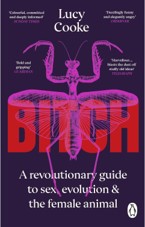What does it mean to be female? Mother, carer, the weaker sex? Think again.
In the last few decades a revolution has been brewing in zoology and evolutionary biology. Lucy Cooke introduces us to a riotous cast of animals, and the scientists studying them, that are redefining the female of the species.
Meet the female lemurs of Madagascar, our ancient primate cousins that dominate the males of their species physically and politically.
Or female albatross couples, hooking up together to raise their chicks in Hawaii.
Or the meerkat mothers of the Kalahari Desert – the most murderous mammals on the planet.
The bitches in Bitch overturn outdated binary expectations of bodies, brains, biology and behaviour. Lucy Cooke’s brilliant new book will change how you think – about sex, sexual identity and sexuality in animals and also the very forces that shape evolution.
You might like to think that science is impartial and unbiased (ha!). The scientific method which begins with observation and moves through the broad steps of hypothesis testing, experimentation, and the analysis and presentation of the resultant data should mean that the outcome is simply the outcome. It’s clear just from the opening pages of Lucy Cooke’s Bitch that this hasn’t always been the case, and that Darwin, for all his good work, has a lot to answer for in assigning the female of the species the role of a “model” Victorian housewife – passive, submissive, and subordinate. As a result, the study of females and of female evolutionary biology has sadly fallen behind the (numerous) studies of their male counterparts as they’ve been considered less interesting, and it’s only been in the last few decades that this has begun to change.
Bitch takes the reader through 11 chapters, each with a different focus but with an underlying theme of setting the record straight when it comes to female animal behaviour and biology. In each, Cooke looks at the previously male-focussed studies that have taken place, the pitfalls in them, and how more recent studies are shaking up the world of zoology. While I’m sure that Bitch barely scratches the surface, it provides a fascinating summary of some of that work and the individuals behind it. I guess the key question is “why does it matter?” Apart from being generally offensive, that is. For the record, this isn’t about discrediting Darwin at all – he did do good work, particularly when considering the religious nature of society at the time and he must have had quite the battle against the creationists of his time. But, if you only look at part of a population, you only get a part of the answer. Who knew? These studies develop upon Darwin’s principles and give a broader picture of evolutionary biology.
Seduction is an awkward game for many males. The stakes are high, as is the suitor’s vulnerability. Timing, technique and a certain amount of chutzpah are all required to secure success. But when the object of your desire is a ferocious predator that eats animals that look like you for breakfast, finding a mate becomes a dance with death.
One of my favourite sections, which opens with the above paragraph, was Fifty ways to eat your lover: the conundrum of sexual cannibalism. I’m a self-confessed arachnophobe, and while this chapter focusses heavily on spider relations, I found it to be oddly fascinating. While the black widow is well known, similar behaviour can be seen amongst many species of spider and indeed other invertebrates. That the female cannot easily be wooed, thereby bucking the trend for the submissive female behaviour expected by some was an outrage to Darwin’s contemporaries. Honestly, the Victorian male ego was extremely fragile. One question that I’ve never really considered previously is what evolutionary benefit comes from eating your partner in some extreme post-coital behaviour. A recent study showed that those who eat their former lover go on to have larger offspring with a higher rate of survival than those who don’t, and so this can perhaps be seen as an admirable piece of paternal nurturing on behalf of the sacrificial male, although some do, understandably, seek to avoid that particular fate.
Written in an accessible and witty style, I found Bitch to be a fascinating look at gender politics in the animal kingdom and the surprisingly androcentric narratives that are still widely accepted as fact today. I was pleasantly surprised to find out that there are many examples of ways in which the female reigns supreme, including examples of females banding together, as well as those who rule outright, some through brute force. I love that scientific study is beginning to reflect this reality, brilliantly outlined here as Cooke offers the reader a fascinating insight in the recent studies that are setting the record straight and building upon what’s already known. Highly recommended for those interested in zoology and evolutionary biology.

Sounds fascinating!
So interesting! And a bit infuriating, but also funny x
Sounds really interesting Jo! x
Thanks, Nicki! Certainly something a bit different for me x